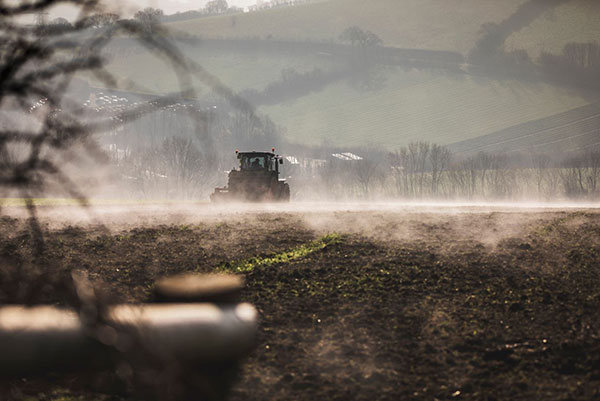The biggest shake-up to farming subsidies for 40 years is on the horizon as a long-awaited Agriculture Bill is brought before parliament.
Farmers will now be paid subsidies based on their care of the environment, rather than the amount of land they own, a move announced previously as the UK leaves the EU and its agricultural policy, known as CAP.
The new funding structure, dubbed payment for ‘public goods’ is described as “one of the most important environmental reforms for many years” by environment minister, Theresa Villiers.
Soil health and agroecology are two measures determined to be a ‘public good’, welcomed by many as bringing the environment to the heart of agricultural policy.
Stronger rules to protect producers and allow them to negotiate fairer returns are also mentioned in the bill under a new ‘Fair Dealing’ clause.
“The spirit (public money for public good) is right and I am prepared to believe that there is a will to turn it into practice,” said founder of organic veg box company, Guy Singh-Watson. “I am particularly pleased to see inclusion of emphasis on regulation and fairness in supply chains.
“There are two huge question around delivery. Will the will hold firm in the face of tough trade deals when other countries demand access to our markets for food produced to lower standards in return for our access to their markets for financial services etc? And how will public goods be measured, quantified and balanced against each other and against demands for cheap food?”
He also noted the huge variation in soils, farm practices and ecology across the country, and hence the need for locally specific practices.

“To be able to play their part in producing healthy food, restoring nature and tackling climate change, farming must have more certainty and decent livelihoods,” said Vicki Hird, sustainable farming coordinator for campaign group, Sustain.
“Sustain is therefore very pleased to see the government maintain the commitments on regulating the supply chain in order to drive out unfair practices – which harm farmers here and overseas, limit their options for investing in sustainable practices and lead to shocking amounts of good food going to waste.
“We welcome the return of the Agriculture Bill and are glad that the Government remains committed to rewarding farmers for public benefits rather than support based on the amount of land they own.”
Gareth Morgan, head of farming and land use policy at the Soil Association, said: “We are pleased to see the continued commitment to public money for public goods in the Agriculture Bill – rewarding farmers who store carbon and protect water and wildlife. It’s great the government has listened and soil is now referenced within the bill and that payments will be available to farmers for protecting or improving soil quality.
“But much more is necessary to bring the radical change our farming sector needs to solve the climate, nature and diet crises. It is disappointing the bill still does not commit to support for farmers to adopt nature-friendly agroecological farming, like organic, or environmental action across the whole farm, rather than in small areas. Nor does it signal support to enable the radical shift away from artificial fertiliser and pesticides needed to restore nature and soils capable of storing carbon.”
Notably absent was a commitment to avoid lowering the standards of food imports under any future trade deals, such as with the US. It comes as Defra minister Villiers stated that the government will not dilute environmental, food safety or animal welfare standards at the recent Oxford Farming Conference, but this was not repeated in the Agriculture Bill.
“It is vital we have proper parliamentary scrutiny of trade deals and it is worrying that the government is resisting legislating on this,” added Morgan.
Hot on its heels, the Environment Bill, is expected to follow in due course, with a focus on biodiversity, protecting nature, and air pollution among its top priorities.













To be fair it is nice to see some good news concerning the use of the land with all the bad news that seems to be around, mostly it would seem by those who are incapable of moving forward with and for the country as a whole – I believe they are known as Remainers or some such insult – surely it is time to ditch all these messages of doom and look forward to a bright new future as a United Nation all working together towards a better future for all not only within this country but the whole world.
the Walrus
Conceptually I think this is a very good idea and takes a pragmatic approach. However, as always it will be dependent upon the implementation, that is the part where these ideas normally go wrong. If during implementation it becomes overly bureaucratic, or payments take ages to come through it will be another Universal Credit.
Recognising farmers as custodians and managers of our landscape is so important, what people see in fields and think of as farms are the people that need help. The large, industrial type farming is done mainly behind closed doors and people just aren’t aware of where their food comes from or how the animals/land is treated. Labelling and marketing MUST change, the supermarkets can’t be allowed to misrepresent packaging with fictious and misleading images as well as names. It needs to clearly state country of origin, rate the production methods, transparency on methods and eco credentials. Something like how eggs are marked but much easier to understand.
We as consumers need to shop consciously, if food is labelled in a transparent fashion then we have to do our bit and realise that quality and cost are linked. The race to the bottom is also an race to poor quality and poor treatment. Buying a chlorinated, GM fed, industrially produced chicken is cheap because of the way it has been produced, An organic, free-range chicken that has been cared for or an organic strawberry from the UK in eaten in June is special because of the care, attention and expense that has been put into the product. Buying the cheapest product from the cheapest supermarket is not the same thing as a quality organic product purchased locally in season from a local farm. We as consumers need to know this and shop accordingly, taking responsibility for our buying choices. If we do then we wouldn’t buy low standard food and it wouldn’t be relevant in a trade agreement. In which case everyone wins because everyone cares and makes choices based on knowledge and priorities
Paul
Transparency and traceability in the food market are key to awakening the public to the way food is brought to the table, including the environmental impact of each product. It seems blockchain technology holds a lot of potential to be used for this in a very positive way!